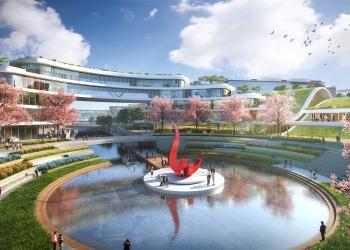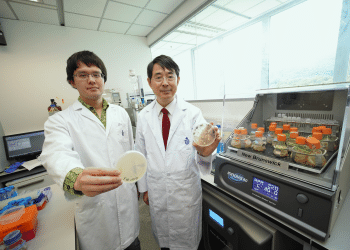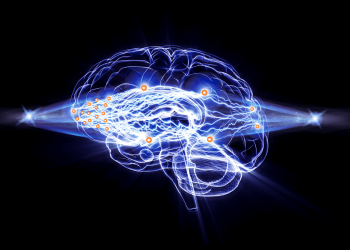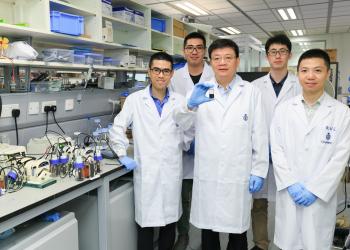News & Stories
2019
News
HKUST and WashU Collaborate on Engineering Education and Research
A high-level delegation led by James M. McKelvey Prof. Aaron BOPICK, Dean of McKelvey School of Engineering (McKelvey Engineering) of Washington University in St Louis (WashU), visited the Hong Kong Universtiy of Science and Technology (HKUST) on September 20, 2019 to sign a memorandum of understanding (MoU) to establish a framework within which cooperation may develop between the two leading universities in the world.
News
Chasing the Dream to Make Greater Medical Impact
Kachin WONG aspired to study Medicine while at secondary school, but his less-than-expected public examination results shattered his dream. The great disappointment, however, turned out to be a blessing in disguise.
He was admitted to HKUST to study biochemistry and cell biology and went on to complete an MPhil program in Technology Leadership and Entrepreneurship (TLE) this year. During his postgraduate studies, he came across a paper by Prof. SUN Fei of Chemical and Biological Engineering (CBE) about smart hydrogels. Hydrogels, also known as soft matter in the medical world, are leading materials for biomedical applications such as drug delivery and stem cell therapy.
News
HKUST Researchers Discover New Virus Traits That May Help Fight Global Warming and Develop Anti-virus Drug
Oxygen levels in the ocean have depleted over the past few decades1 due to global warming and emissions of greenhouse gas, causing pollution and disrupting our ecosystem. In efforts to curb the trend, researchers from the Hong Kong University of Science and Technology (HKUST) discovered a mechanism that may eventually help an eco-friendly aquatic bacterium clean up more carbon dioxide in the ocean and produce more marine oxygen.
Like trees on land, cyanobacteria, or what commonly known as blue-green algae, perform photosynthesis in the ocean. They provide oxygen for marine life and absorb over 20% of the world’s total carbon emission. However, natural predation and virus infection kill nearly half of the world’s cyanobacteria on a daily basis. A virus called cyanophage alone, wipes out one fifth of the total cyanobacterial population every day.

News
HKUST(GZ)’s Preparatory Status Approved by the State Ministry of Education
The Hong Kong University of Science and Technology (HKUST) has started a new chapter as The State Ministry of Education (MoE) has approved its application for proceeding to establish The Hong Kong University of Science and Technology (Guangzhou) (HKUST (GZ)). The new campus will synergize with and maintain the same academic standard as that of its Clear Water Bay (CWB) counterpart. HKUST (GZ) will nurture talent and facilitate collaboration amongst Hong Kong, the Greater Bay Area (GBA) and beyond on education, research and commercialization, while strengthening knowledge transfer to bridge Hong Kong’s gap in high-tech manufacturing.

News
HKUST Researchers Unlock Cancer-Causing Mechanism of E. coli Toxin with Synthetic Biology Approach Paving Way for New Preventive Measures for Colorectal Cancer
An inter-disciplinary team of researchers at the Hong Kong University of Science and Technology (HKUST) unraveled how a toxin released by Escherichia coli (E. coli) – a human gut bacteria, is connected to colorectal cancer, offering new insights to the health impact of this prevalent bacteria and facilitating future research on the prevention of this third most common cancer worldwide*.

News
HKUST Researchers Build the World’s First All-Optical Multilayer Neural Network Paving Way for Next Generation of AI Hardware
Researchers from The Hong Kong University of Science and Technology (HKUST) have developed the world’s first all-optical neural network for deep machine learning – bringing artificial intelligence a step closer to matching human brains in tackling complex problems such as pattern recognition or risk management, and at much lower energy consumption at the speed of light.

News
Biology Saves STEM Education from Its Shackles
STEM has been a “buzzword” in Hong Kong’s educational scene in recent years with schools investing resources in technology gadgets, but for Prof. King CHOW of Division of Life Sciences, the efforts do not seem to be on the right track. Hong Kong is a city known for rote learning, a key element of STEM education - trying to solve problems in an interdisciplinary approach - is missed out. This not only results in a cul-de-sac in science education but also an impediment to nurture innovators or scientists that Hong Kong needs.
“STEM is really about allowing students to learn about methodology, approach and principles, and rules in application. Unfortunately, in many high schools and universities in Hong Kong, students learn information but miss out on logic and the analytical aspect of it,” comments Prof. Chow.

News
HKUST-led Research Successfully Develops Rechargeable Liquid Fuels to Power Electric Vehicles and Electricity Grid
A cross-university research project led by The Hong Kong University of Science and Technology (HKUST) has successfully developed an environment-friendly rechargeable liquid fuel that promises to have impact on a global scale. It can fully recharge an electric vehicle in a matter of minutes – a great enhancement from existing battery technology which usually takes hours.
This fuel – called ‘e-fuel’ – is carbon-neutral if charged with solar or wind energy. Like fossil fuels, it can be readily dispatched to the power grid, and also rapidly recharged to vehicles.
The research, titled ‘Creation of Rechargeable Electron-fuels for Stationary Power Supplies and Electric Vehicles’, is led by Prof. ZHAO Tianshou of HKUST and supported by academics from The University of Hong Kong, The Chinese University of Hong Kong, and The Hong Kong Polytechnic University.






